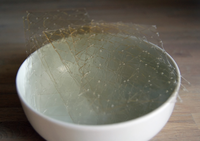
Photo from wikipedia
It is challenging to regenerate enzyme carriers when covalently immobilized enzymes suffered from inactivation during continuous operations. Hence, it is urgent to develop a facile strategy to immobilize enzymes reversibly.… Click to show full abstract
It is challenging to regenerate enzyme carriers when covalently immobilized enzymes suffered from inactivation during continuous operations. Hence, it is urgent to develop a facile strategy to immobilize enzymes reversibly. Herein, the non-covalent interaction between protein and carbohydrate was used to adsorb and desorb enzymes reversibly. Laccase was immobilized onto glycopolymer microspheres via protein-carbohydrate interaction using lectins as the intermediates. The enzyme loading and immobilization yield were up to 49 mg/g and 77.1% with highly expressed activity of 107.9 U/mg. The immobilized laccase exhibited enhanced pH stability and high activity in catalyzing the biodegradation of paracetamol. During ten successive recoveries, the immobilized laccases could be recycled while maintaining relatively high enzyme activity. The glycopolymer microspheres could be efficiently regenerated by elution with an aqueous solution of mannose or acid for further enzyme immobilization. This glycopolymer microspheres has excellent potential to act as reusable carriers for the non-covalent immobilization of different enzymes.
Journal Title: Bioresource technology
Year Published: 2021
Link to full text (if available)
Share on Social Media: Sign Up to like & get
recommendations!